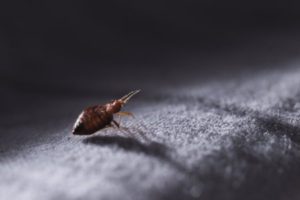DO BED BUGS DIE OFF IN THE WINTER?
By Chris Williams on January 14, 2020.
We had a bed bug problem in our home this last summer and still haven’t gotten rid of them completely, although we seem to be getting close! What happens to bed bugs in the winter? Can we hope that the remaining bugs will die out before spring?
L.L., Kingston NH
There’s very little chance that winter is going to affect your bed bugs unless you are moving out and leaving your home unheated. Even that generally won’t kill bed bugs. Think about it. Bed bugs are living in a strictly climate-controlled environment in your home. The changeover to winter means very little to them, assuming your home is still kept at a reasonable temperature. Plus, they have warm human bodies nearby to provide heat (and blood) at night.
WINTER MAY SLOW DOWN BED BUG ACTIVITY SLIGHTLY
About the only way bed bugs living in a residence are affected by winter is that the bedrooms where they hide are probably a few degrees cooler at night in January than they are in July. This slight temperature drop can have a bit of an effect on bed bug development and reproduction. If bed bugs got to pick their ideal temperature, it would probably be about 80°F. At this temperature, bed bugs develop more quickly and feed on blood more often — about every three days. Compare this to a bedroom temperature of 64°F., when bed bugs have slowed their metabolism and feed only about once a week.

BUT, WINTER CAN EXTEND THE LIVES OF BED BUGS
Just because cooler winter temperature in your home slows bed bugs down, doesn’t mean it harms them or hastens their death in any way. If you’ve changed your sleeping arrangements and left the bed bugs alone in a different room without an opportunity to feed, you’ve probably even extended their lives. Starved bed bugs, or those that can feed only infrequently, slow down their metabolism and survive even longer at lower temperatures.
Bed bugs can survive 5 to 10 times longer in starvation mode at 50°F than at 80°F. For example, an adult male bed bug can live about 402 days after his last blood feeding at a cool 50°F., but will last for only about 43 days without feeding again when the temperature is a constant 80°F.
The effect that temperature has on bed bug development is one reason why bed bugs multiply faster and bed bug problems increase in summer months (other reasons are summer increase in human activity and travel). Bed bugs do have an upper temperature range though. If they are exposed to constant temperatures above 93°F. for days or weeks, they begin to die. The bad news is that bed bugs can reportedly remain active and feeding at temperatures as low as 44°F.
WINTER CAN’T KILL BED BUGS, BUT A PROFESSIONAL CAN!
So, whether you are still sharing your bedroom with bed bugs or whether they are isolated in another part of the house, they aren’t going anywhere without pest control intervention. Come warmer spring weather they will become more active and may even be very hungry.
One final word: if you’ve been trying to control a bed bug infestation on your own, you should know that experts agree that DIY bed bugs is practically impossible. Bed bugs are one pest that always calls for professional intervention. Give Colonial Pest a call and let us eliminate that bed bug infestation.